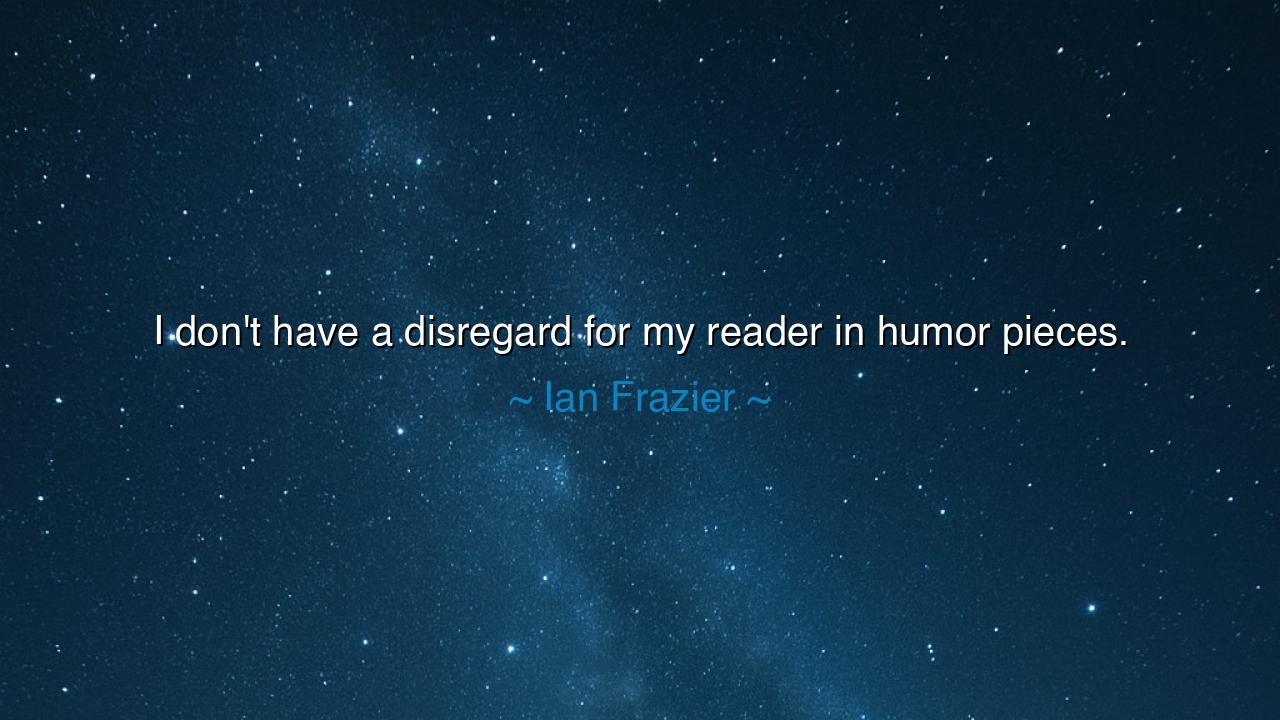
I don't have a disregard for my reader in humor pieces.






When Ian Frazier said, “I don’t have a disregard for my reader in humor pieces,” he uttered not just a statement of artistic principle, but a quiet moral truth. In this age, where words are often wielded carelessly, his declaration stands like a carved stone tablet reminding us that laughter — when crafted with wisdom — carries both grace and responsibility. To regard the reader, to hold them in esteem even while seeking their laughter, is an act of reverence. For humor, though it may sparkle like a jest, is built upon the sacred bridge between two minds — the writer and the reader, the speaker and the listener, the heart that gives and the heart that receives.
The meaning of this quote reaches far beyond the craft of writing. It speaks to the ethics of communication itself — the recognition that words, like arrows, can either wound or awaken. Frazier’s words tell us that humor without empathy is hollow, that wit without regard becomes cruelty disguised as cleverness. True humor, in his eyes, is not the art of derision but the art of connection. It does not humiliate; it illuminates. It does not sneer from above, but smiles from alongside. The humorist, like the philosopher, must remember that every laugh comes from a soul — and the soul deserves to be honored, not used.
In the ancient world, laughter was not a frivolous act, but a measure of wisdom. The philosophers of Greece spoke of eutrapelia — the virtue of well-placed humor. Aristotle wrote that wit should be graceful and fitting, never excessive, never degrading. Even Socrates, who wielded irony like a blade, used it not to mock but to awaken — to stir the minds of his students toward truth. Their laughter, born of recognition, was a laughter of enlightenment. In this same tradition, Frazier stands as a modern heir. He understands, as they did, that laughter guided by conscience is among the noblest tools of the human spirit — capable of easing pain, bridging difference, and revealing the absurdities that imprison us.
History gives us luminous examples of this sacred balance. Consider Abraham Lincoln, who led his people through the darkest of days. His humor was gentle, self-effacing, and wise. Once, when accused of being two-faced, he replied, “If I were two-faced, would I be wearing this one?” The laughter that followed did not divide — it disarmed. Lincoln’s humor carried regard for his audience, even his enemies. It did not belittle; it healed. In every jest, there was humility — the kind that says, “We are all imperfect, and that is why we can laugh together.” Frazier’s philosophy flows from that same stream of integrity. To him, humor is not a performance for applause, but a communion of minds where laughter becomes a shared act of grace.
To disregard the reader, Frazier implies, is to abandon the sacred trust between creator and receiver. It is to forget that art, at its best, is a form of service. The humorist who writes only for himself chases vanity; the one who writes for others pursues understanding. Frazier’s humor, refined and thoughtful, invites his readers not merely to laugh, but to see. He offers them a mirror — not a weapon. In his humility, we find wisdom: that laughter, when born of respect, carries more truth than any insult ever could.
This principle holds true not only for writers, but for all who use words. The teacher who mocks their students, the leader who derides the weak, the friend who jokes without mercy — all commit the same sin of disregard. For words, when stripped of empathy, lose their light. But the one who speaks with care, even in jest, transforms humor into harmony. Laughter becomes an act of love, not of power. The ancients knew this; so did every great storyteller who ever lived. Frazier’s wisdom is their echo — a reminder that the heart must always govern the tongue.
So, my listener, let this teaching take root within you: regard those who receive your words. Whether you speak to a crowd or whisper to a friend, remember that your words enter the sanctum of another’s soul. If you seek to make them laugh, do so with grace; if you seek to teach, do so with humility. Laugh with, never at. Share humor that enlightens, not humor that wounds. The laughter that builds understanding is the laughter that lasts.
In the end, Ian Frazier’s lesson is simple yet eternal: the truest humorist — and indeed, the truest human being — is one who respects the heart of another. When you regard your listener, you honor yourself. When you honor your audience, you ennoble your art. Speak, then, as one who carries light; write, as one who tends a fire meant to warm, not to burn. And when you make the world laugh, let it be a laughter that remembers — that we are all frail, all foolish, and all in need of kindness. For in that laughter, shared and sincere, the human spirit finds its most sacred joy.






AAdministratorAdministrator
Welcome, honored guests. Please leave a comment, we will respond soon